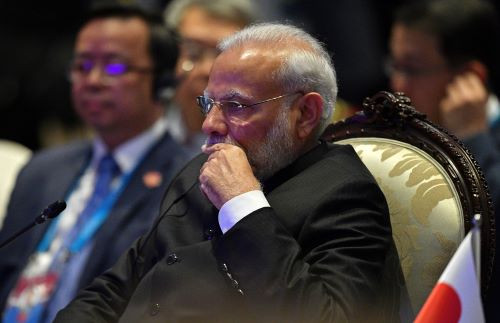India showed doubts about its participation in the upcoming Sixteen-nation Regional Comprehensive Economic Partnership which is the largest trade deal of the world. The country's reluctance to the trade deal was manifested during the East Asia Summit.
India believes that small businesses in India would be adversely affected if there would be unrestrained imports of cheap Chinese goods. The character of India is also protectionist by instinct. They also refuse to remove agricultural tariffs which would impact their small-scale farmers on the negative as well.
The draft for the Regional Comprehensive Economic Partnership (RCEP) read, "Most market access negotiations have been completed and the few outstanding bilateral issues will be resolved by Feb 2020," reported The Guardian. The alleged cause for the delay was India's resistance to engage in trade with China.
Although the agreement is already finished with its 20 chapters, a side note read that there is a pending resolution of one country which was revealed to be India. India believes that a flood of cheap mass-produced Chinese goods may deteriorate its economy. Thus, the bilateral agreement is put on hold as the pact is delayed due to the unresolved issues that India raised.
However, there was also indicated that all of its members were committed to signing the RCEP. These include Vietnam, Indonesia, Cambodia, Brunei, Thailand, Malaysia, Laos, Myanmar, Singapore, Philippines, China, Japan, South Korea, Australia, New Zealand, and India.
According to Australia's trade minister Simon Birmingham, the delay is not unusual as trade deals between countries are always complicated. Birmingham spoke in Bangkok and said that Australia also seeks to accomplish an ambitious agreement but remains realistic about the demands that their country seeks from the other members.
Birmingham said that the 16 countries of the trade deal are distinct regarding their population, development, and cultural differences making negotiations more challenging. He also raised that these differences are also common among trade deals of other nations worldwide.
In other news, the Hindu Business Line reported that the RCEP was further discussed in the East Asia Summit today. It was decided that India would be given more time to address its concerns with the proposed RCEP especially those related to the opening of markets for China.
It was revealed that the 16 nations experienced hectic negotiations. It was then presumed that India may finalize its decision by February 2020. India's Prime Minister Narendra Modi and the other nations' leaders would meet again to address the negotiations. They are also expected to make an announcement regarding the progress of RCEP's finalization.






